
Top HR lessons for Gen-Z workforce from ‘The Devil wears Prada’
The famous movie “The Devil wears Prada” was recommended to me by my first ever boss at a time where I was hustling with never ending requests and demands that came in for a management trainee. I remember watching it back then, awed by Andy’s hustle and courage to stick through, it was motivating and inspirational at that time.
Fast forward to 2022, I watched it again. I realized what a toxic work culture that is and how employee wellbeing is not even considered as priority. Things have drastically changed in two decades, HR is taking over putting employees first in terms of experience, learning and culture. The millennial generation is rapidly transitioning to Gen-Z demands on how a workplace should be to suit them. While watching it, so many bells were ringing in my head, there are so many lessons – a young HR professional can learn from this movie.
A good onboarding experience will result in retention and high productivity
Andy is being bombarded with tasks on her first day at work with no training or introductions.
There is absolutely no excuse for bad onboarding experience. There has to be a process where employee is given the job role, introduced to teams and given adequate training and time to learn. Showing them around the office, giving them a glossary if they are from a different industry, and much information and detail for them to transition.
It is necessary to measure onboarding experience after a month or so with a survey to understand if the employee had a pleasant one.
Lesson 2:
Clear communication between supervisor and employee is mandatory.
Andy is not allowed to ask questions from Miranda, and after every interaction with her boss Andy ends up being confused.
Lack of engagement which ends up with employees resigning or less productivity, mostly due to lack of communication from management. Managers need to give clear outlines of what their expectations are and allow two-way communication where the subordinate can clarify certain areas.
Frequent meetings: stand-up daily meetings, weekly meetings etc are necessary for employee where feedback can be provided for improvement.
Lesson 3:
A psychologically safe work environment for employees is priority.
Andy experiences bullying, being laughed at her dress sense and even been body shamed.
Lesson 4:
Employee wellbeing and work life balance has to be taken very seriously.
Andy’s being used at work in a way where she has no personal life. She struggles to balance her personal life and relationships which are hanging on thread.
Employee burnout should be looked into seriously and the necessary support has to be given to recover. There needs to be clear time-offs for employees and working 24/7 will result in major burnout. Having a difficult and abusive boss also is a key reason for burnout.
HR needs to give sufficient advice and guidance to team heads and managers how not to let subordinates get stressed and overworked and have a process to manage internally.
Employee experience is an area which organisations focus to stay ahead of competition. Unlike a few years ago, many candidates ask employer questions on work culture, employee engagement and
flexibility. Recruiting good people is tough, retaining them during this great recession time is even tougher. HR needs to level up their game because unlike millennials, Gen-Z won’t settle for less.

